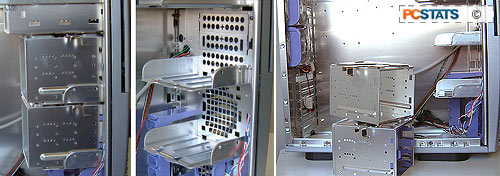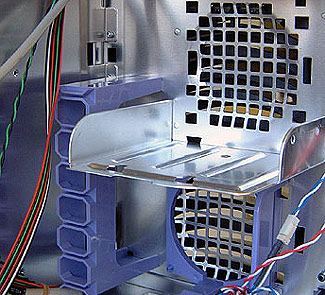
If I'd have to guess at the weight of the Scorpio case, I would say it
weighs about 3-4 pounds. This is obviously a benefit to working with a case that
is built entirely of 0.7mm thin sheet-aluminum, but also I think the thin metal is
thick enough to handle most bumps and scrapes without a problem.
Given the popularity of LAN gaming, an aluminum case can easily knock
off a few pounds from the total weight of a computer system, and that makes lugging a PC
out to the gaming arena all the more easier.
The one qualm I have about the material is that the aluminum hasn't been
anodized to protect it from oxidation over time. Pure aluminum also makes
dropping in and removing the HDD racks a tricky process; being that the aluminum
can get "sticky" with just a few surface scratches.

Before we get too far ahead of ourselves, the specs
for the Raidmax Scorpio case are as follows; the enclosure measures
roughly 12" x 8" x 19" and comes with (4) 5.25" bays, (2) 3.5" floppy bays and
(4) 3.5" HDD bays. As we mentioned earlier, three case ventilation fans are
included, and one of those is equipped with multi-coloured LEDs.
 There is
actually room for a total of five 80mm fans within the chassis; two
fan spots are located just behind the processor at the rear, one on the clear
side panel, and two up front by the HDD caddy.
There is
actually room for a total of five 80mm fans within the chassis; two
fan spots are located just behind the processor at the rear, one on the clear
side panel, and two up front by the HDD caddy.
In cases of this design we have tested before a
washable filter of open celled foam was sandwiched between the front bezel
and the metal frame to help control dust, but this little extra is missing from
the Scorpio.
The motherboard tray in the Scorpio is
not removable (as it is with all other cases of this design) so motherboard installation involves
placing the board in the case and fiddling around with the whole
assembly.
With the
3.5" drive bay caddies pulled out, this installation goes a lot smoother, and the
case is the right size for standard-sized ATX compatible motherboards (12" x
10.5").
